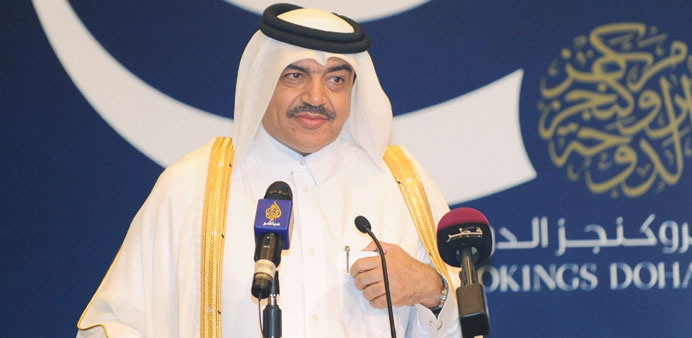HE the Minister’s Assistant for Foreign Affairs Mohamed bin Abdullah bin Mutib al-Rumaihi speaking at the Brookings Doha Energy Forum 2015 in Doha. PICTURE: Najeer Feroke
By Peter Alagos/Business Reporter
Geopolitical unrest, among other underlying factors, continues to affect the global oil market, which Qatar plans to address, HE the Minister’s Assistant for Foreign Affairs Mohamed bin Abdullah bin Mutib al-Rumaihi said.
“The changes in geopolitics, political economy, and markets alter the energy landscape. This, once again, is extremely relevant and timely,” noted al-Rumaihi, who was speaking before the Brookings Doha Energy Forum 2015 held from March 25 to 26 at the Four Seasons Hotel in the city.
In his speech, al-Rumaihi also said Qatar is planning to host conciliatory talks aimed at addressing political turmoil in Yemen, which plays a major role in global oil exports from the Middle East.
Yemen controls the Bab el-Mandeb Strait, a conduit between the Mediterranean Sea and the Indian Ocean for many oil tankers.
“The State of Qatar prides itself in playing a constructive role in regional and global politics and energy markets. One way to accomplish this is by providing a venue to engage in dialogue about key issues just as we now plan to do by hosting talks between Yemen’s factions in an effort to resolve our neighbour’s political crisis,” he said.
However, al-Rumaihi did not provide any specific details of the dialogue during his speech, including the proposed date of the planned conciliatory talks.
Aside from Yemen, al-Rumaihi cited other factors that had affected the global oil market such as falling prices of crude, the US shale boom, and ongoing talks between Iran and the US, UK, Russia, China, and France, plus Germany, otherwise known as P5+1.
“Over the past year, oil and gas prices have fallen significantly and also, we have seen the boom that has continued in the United States of America — the boom in shale gas; and this has led to regional instability and conflict, which has affected energy production and exports in some countries in the Middle East and some other parts of the world. And also, we can see continued negotiations between Iran and the P5+1 powers,” al-Rumaihi said.
Brookings Doha Centre director Salman Shaikh said the forum, which takes on the theme “Energy stability or a false sense of security: How changes in geopolitics, political economy, and markets alter the energy landscape,” examines the relationship between the Middle East, established energy markets in Europe and the US, and emerging Asian powers.
He said the forum will revolve on the changing geopolitics of energy, the implications of political and economic changes in the Middle East and Asia for energy production and consumption, and the shifts in global energy markets and their consequences for pricing.
“Constant political uncertainty and the changes in the geopolitical landscape pose a number of challenges for energy producers in the world, and particularly in the Middle East,” Shaikh said.
He added, “This year’s forum seeks to analyse and address changes in global energy markets by bringing together government officials, business leaders, and industry experts from around the world for valuable, in-depth discussion in a framework that encourages ground truth understandings.”

